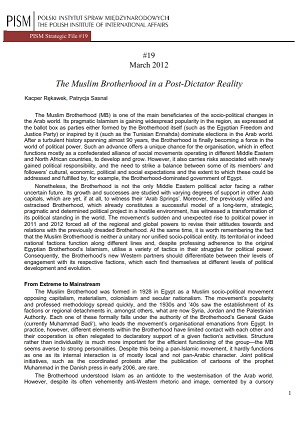№19: The Muslim Brotherhood in a Post-Dictator Reality
№19: The Muslim Brotherhood in a Post-Dictator Reality
Author(s): Patrycja Sasnal, Kacper Rękawek
Subject(s): Civil Society, Islam studies, Government/Political systems, International relations/trade, Politics and religion, Politics and society, Sociology of Politics, Sociology of Religion, Geopolitics
Published by: PISM Polski Instytut Spraw Międzynarodowych
Keywords: The Muslim Brotherhood; Arab world; socio-political change; social movements; political power; Middle East; North Africa;
Summary/Abstract: The Muslim Brotherhood (MB) is one of the main beneficiaries of the socio-political changes in the Arab world. Its pragmatic Islamism is gaining widespread popularity in the region, as expressed at the ballot box as parties either formed by the Brotherhood itself (such as the Egyptian Freedom and Justice Party) or inspired by it (such as the Tunisian Ennahda) dominate elections in the Arab world. After a turbulent history spanning almost 90 years, the Brotherhood is finally becoming a force in the world of political power. Such an advance offers a unique chance for the organisation, which in effect functions mostly as a confederated alliance of social movements operating in different Middle Eastern and North African countries, to develop and grow. However, it also carries risks associated with newly gained political responsibility, and the need to strike a balance between some of its members’ and followers’ cultural, economic, political and social expectations and the extent to which these could be addressed and fulfilled by, for example, the Brotherhood-dominated government of Egypt.
Series: PISM Strategic File
- Page Count: 4
- Publication Year: 2012
- Language: English
- Content File-PDF

